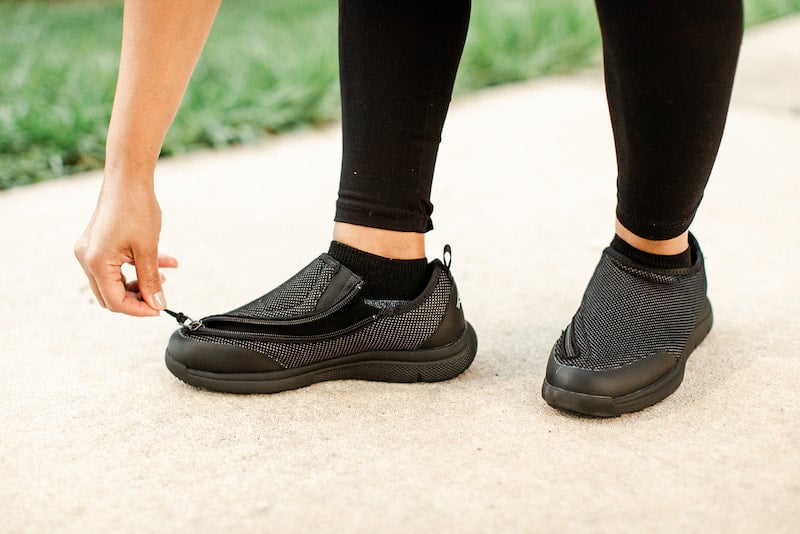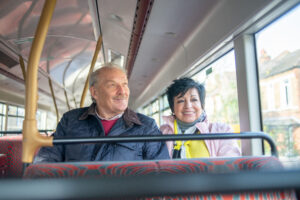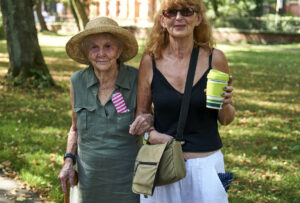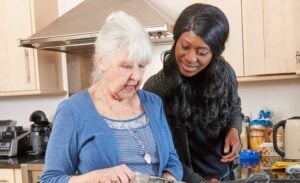Finding the right pair of shoes in later life
Tags
Living Well
A well-fitting pair of shoes can help you stay as independent as possible. Yet finding footwear that fits well, is comfortable, and doesn’t look like ‘old people shoes’ can be a struggle.
We spoke with physiotherapist Nancy Farmer from Friendly Shoes to understand why a good-fitting pair of shoes is so important as we age, and how to find them.
Finding shoes as we get older can be a challenge. Our feet can get wider or swell, we might have orthotics we need to wear, and tying fiddly laces every day isn’t always possible if someone’s mobility or dexterity is reduced.
What this means is that often, people rely on just one pair of shoes (or even slippers) that fit, but that don’t provide the optimum support. “When we wear ill-fitting shoes, we’re at more of a risk of falling” explains Nancy.
“Backless slippers, shoes that have no space for much-needed orthotics, slip on trainers can all make people less steady on their feet and lead to falls. A fall often doesn’t happen in isolation.
Without changes such as finding the right pair of shoes, someone can easily fall again (especially in winter when it’s wet and icy) and this can lead to them staying home more and feeling isolated. Correct footwear can help people get out and about and lead a more independent life.
Finding the right pair
So where do you start? Here’s Nancy’s top tips:
- Know your size. If you’re shopping online, trace around your foot and measure the length and width. Then check that with the company’s size guide. If in doubt, contact them.
- Make sure they’re easy to get on and of. Bending down or lifting legs up isn’t always comfortable or possible. Friendly Shoes are easier to get on and off than other shoes thanks to a wide zip opening. Simply zip it open and slide the foot in.
- Look for a wide fit. If feet swell, you have bunions or you just have wide feet then you need to make sure there’s adequate space in the toe box and shoe overall. We start at an E width.
- Room for orthotics. Orthotics are there to help your foot health, so you need shoes that work with them. Friendly Shoes all have removable insoles which can be taken out for more space overall, or to accommodate your orthotics.
- Good grip. Steady yourself with a good sole. The soles on Friendly Shoes have all been anti-slip tested.
- Fasten them securely. Velcro is easy to do up but it doesn’t offer the range of adjustment always needed – plus it doesn’t always look great. Some of our shoes have laces, so you can set the preferred tension on the first wear and then just use the zip.
If you want to try Friendly Shoes, visit www.friendlyshoes.co.uk.
Read more later life articles

Dementia care – dealing with behavioural changes
People with dementia may begin to behave in ways that the people around them don’t understand, as the condition progresses. This can be upsetting to

What are the 7 stages of dementia?
Every dementia experience varies from person to person. However, understanding how the condition progresses can help you to plan for the future, and arrange the

12 summer safety tips for the elderly
It’s important for everyone to take care in hot weather – anyone can become unwell if they’re exposed to soaring temperatures. However, for older people

Live-in care vs other types of care
Live-in care vs other types of care Navigating elderly care options for a loved one is a significant decision. While care homes are a common

Defining Dignity in Later Life – Interview with Liz Lloyd
We talked to Liz Lloyd about personal and social perceptions of age, the challenges of identity, empowerment and choice.

The Challenges of Vegetarians and Vegans Living with Dementia
We talk to Amanda Woodvine about the challenges faced by older vegetarians and vegans receiving care. Read more here.